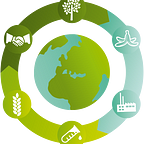Talking in circles? Why discourses matter for the future of Circular Economy
Author: Marius Hohl
Given that nowadays even VOGUE Magazine publishes articles about Circular Economy, one can truly say the concept has become fashionable. Issued from the realm of environmental economics, Circular Economy is commonly depicted as “[…] an economic system that replaces the ‘end-of -life’ concept with reducing, alternatively reusing, recycling and recovering materials in production/distribution and consumption processes.”.
Frequently presented as a pathway to a brighter future, one advantage of Circular Economy seems to be its connectivity to a wide range of crosscutting goals. In other words, adopting a Circular Economy seems quite desirable, since it offers economic, ecological and social benefits. However, Circular Economy means different things to different people and recent analyses have identified a myriad of (competing) scientific as well as stakeholder definitions of Circular Economy. Hence, its malleable shape might lead to rather different and contested understandings of goals and pathways for a Circular Economy.
The French Circular Economy Road Map clarifies that defining tangible goals and actors of Circular Economy is not as straightforward as one might think
Consequently, talking about Circular Economy can quickly turn into talking in circles. For instance, researchers at the Institut Montaigne perceive Circular Economy as the decoupling of economic growth and excessive use of resources, while others comprehend Circular Economy as a steady-state-economy strategy that cannot be connected to the “old” growth paradigm. Admittedly, these are two extreme examples, but differences in prevalent perceptions can also be found on a smaller scale. What’s more, such struggles about definitions can be amplified by the fact that ideal-typical goals of Circular Economy — enhancing social, environmental and economical benefits — are not necessarily mutually reinforcing, but can indeed turn out to be contradicting. For instance, Laurenti et al. point out that “[…] the circular economy could lead to increased environmental impacts due to an overall increase in production and the use of products […]”. Since some kind of trade-off seems inevitable, defining the predominant goals of a Circular Economy becomes ever more important in instances of practical implementation, especially as they usually involve different actors with different agendas.
The recently adopted Circular Economy Road Map of the French environmental ministry illustrates this point well. In fact, the French Road Map points out economic, ecological as well as social benefits of a Circular Economy — e.g. reducing resource consumption, waste production and CO2 emissions, while also leading to the creation of up to 300.000 jobs — and could thus be argued to represent a balanced implementation basis. Nevertheless, a draft of the Road Map was sharply criticized by different French Non-Governmental Organizations (NGOs) for hardly mentioning the social dimensions of Circular Economy. Suggesting that the draft was ignoring social effects of a Circular Economy and the important role charitable organizations can and should play in it, these NGOs clearly contested the governmental interpretation of Circular Economy. Furthermore, another contentious point referred to the engagement of different actors and asymmetrical power positions. With reference to corporations’ strong agenda-setting power, a leading network of French communities criticized the drafting process of the Circular Economy Road Map and suggested that community leaders should have a greater say in the definition of key measures. Hence, the French Road Map clarifies that defining tangible goals and actors of Circular Economy is not as straightforward as one might think.
Political discourses should be apprehended as barriers for some and enablers for other interpretations of Circular Economy
Therefore, it seems noteworthy that current research on Circular Economy has neither fully acknowledged the extreme diversity of political Circular Economy strategies and their potential trade-offs nor understood the disparate goals of stakeholders. As Circular Economy is high up on political agendas in Europe, defining potentials, goals, actors, and implementation pathways is a political process. These political struggles demonstrate that future pathways of Circular Economy must be embedded in previous political discourses and have to enable stakeholders to create a convincing story line. Hence, Circular Economy is what we make of it. Stakeholders who manage to create an attractive story line about Circular Economy have a considerable say in what future transformation pathways will look like. Political discourses should thus be apprehended as barriers for some and enablers for other interpretations of Circular Economy. While studies on prevailing discourses about Circular Economy exist, more research on political discourses and their effects is necessary. On the one hand, such research will put the results of technological, economic and environmental assessments of Circular Economy strategies in a wider political and societal context and help to evaluate their feasibility and desirability. On the other hand, a closer look at discourses and different interpretations of Circular Economy might help to avoid talking in circles.
